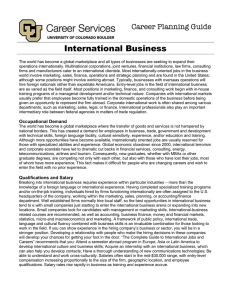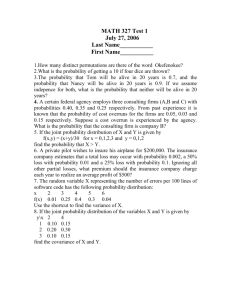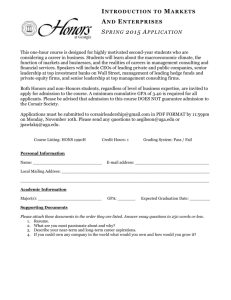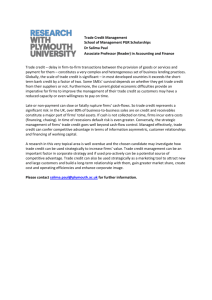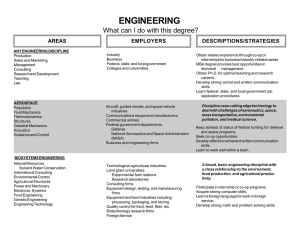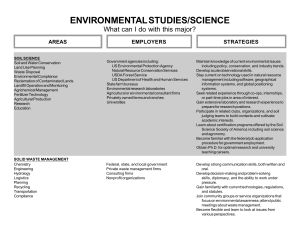Career Opportunities in International Business
advertisement
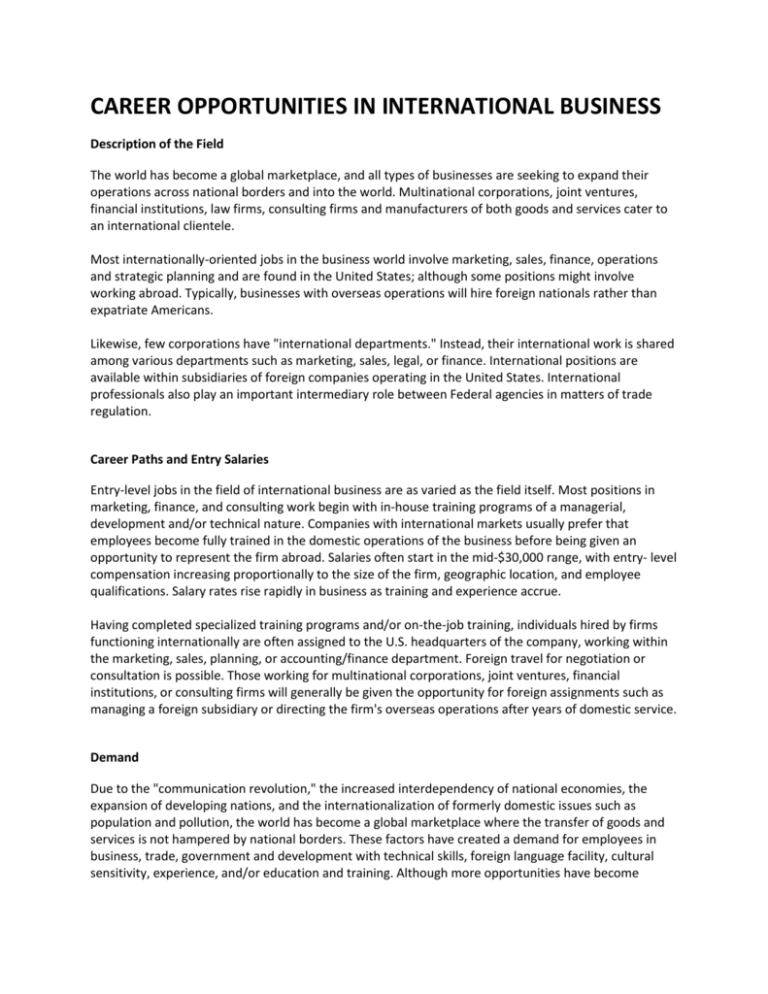
CAREER OPPORTUNITIES IN INTERNATIONAL BUSINESS Description of the Field The world has become a global marketplace, and all types of businesses are seeking to expand their operations across national borders and into the world. Multinational corporations, joint ventures, financial institutions, law firms, consulting firms and manufacturers of both goods and services cater to an international clientele. Most internationally-oriented jobs in the business world involve marketing, sales, finance, operations and strategic planning and are found in the United States; although some positions might involve working abroad. Typically, businesses with overseas operations will hire foreign nationals rather than expatriate Americans. Likewise, few corporations have "international departments." Instead, their international work is shared among various departments such as marketing, sales, legal, or finance. International positions are available within subsidiaries of foreign companies operating in the United States. International professionals also play an important intermediary role between Federal agencies in matters of trade regulation. Career Paths and Entry Salaries Entry-level jobs in the field of international business are as varied as the field itself. Most positions in marketing, finance, and consulting work begin with in-house training programs of a managerial, development and/or technical nature. Companies with international markets usually prefer that employees become fully trained in the domestic operations of the business before being given an opportunity to represent the firm abroad. Salaries often start in the mid-$30,000 range, with entry- level compensation increasing proportionally to the size of the firm, geographic location, and employee qualifications. Salary rates rise rapidly in business as training and experience accrue. Having completed specialized training programs and/or on-the-job training, individuals hired by firms functioning internationally are often assigned to the U.S. headquarters of the company, working within the marketing, sales, planning, or accounting/finance department. Foreign travel for negotiation or consultation is possible. Those working for multinational corporations, joint ventures, financial institutions, or consulting firms will generally be given the opportunity for foreign assignments such as managing a foreign subsidiary or directing the firm's overseas operations after years of domestic service. Demand Due to the "communication revolution," the increased interdependency of national economies, the expansion of developing nations, and the internationalization of formerly domestic issues such as population and pollution, the world has become a global marketplace where the transfer of goods and services is not hampered by national borders. These factors have created a demand for employees in business, trade, government and development with technical skills, foreign language facility, cultural sensitivity, experience, and/or education and training. Although more opportunities have become available, internationally oriented jobs are usually reserved for those with specialized abilities and experience. That said, however, the world economic slowdown starting in 2000, along with corporate scandals, suspect accounting practices, the collapse of organizations such as Enron and Arthur Andersen and international terrorism have led to dramatic cut backs in financial services, consulting, energy, telecommunications, airlines and tourism. Consequently, new graduates, whether with MBAs or graduate degrees in International Relations, are competing not only with each other, but also with those who have lost their jobs, most of whom have significantly more experience. This fact makes it more difficult for people who are changing careers and wish to enter the field with no prior experience. Qualifications Necessary to Enter the Field Breaking into international business requires experience within particular industries - more than the knowledge of a foreign language, area studies, or international experience. Well established firms normally hire local staff, so the best opportunities in international business tend to be with small companies just starting to enter the international business arena or expanding to new locations. Small companies look for candidates with management and marketing skills. International businessrelated courses are recommended, as well as accounting, business finance, money and financial markets, statistics, micro- and macroeconomics and marketing. A framework of public policy, international trade, language and cultural fluency combined with business skills is an invaluable combination for those looking to work in international business. While firms are still willing to train qualified candidates who have no specific experience in their business, they are more interested in people who can be productive from their first day on the job, as training programs are being curtailed because they expensive both in terms of cost and time. If you can show experience in the company's business or sector, you will be in a stronger position. If you develop a relationship with people who make the hiring decisions in these companies, it will facilitate your chance of getting your foot in the door. "The Complete Guide to International Jobs and Careers" recommends that those interested in international business: • • Attend a semester abroad program in Europe, Asia or Latin America which involves studying and interacting with the local international business community. Acquire an internship with an international business that puts you at the heart of the International business community where you develop numerous contacts with individuals in many different businesses. Several companies, such as JPMorgan Chase, Salomon Brothers, IBM, Monsanto, United Technologies, General Electric, and Allied-Signal, have established internship programs. It is also possible to create your own "ad hoc" internship by contacting companies directly and selling them on the idea of letting you work for them as an unpaid or low-paid intern. Have a thorough understanding of new communications technologies. The convergence of Internet-based and telephone technologies, notably wireless, has deep implications for all businesses. Issues such as confidentiality and privacy, cross-border intellectual property rights, and a host of efficiency improvements (e.g. voice-over IP telephony, or VoIP) are at the top of many CEO's lists. • Be able to understand and work across cultures: this area is one where students with international degrees are highly qualified. This is even more valuable to firms that have to do more and more business in new supra-national frameworks like the EU or WTO. Stress these elements in your background, and think of taking internships in areas which will increase your exposure to and awareness of other cultures, even if they are not directly related to the sector you eventually wish to work in. Sample Employers • • • • • • • • • • • • • • • • • • • • • American Express http://www.americanexpress.com American International Group http://www.aig.com Cargill http:// www.cargill.com Chubb & Sons http:// www.chubb.com CIGNA Corporation http://www.cigna.com Diageo http://www.diageo.com Dole Fruit Company http://www.dole.com Eli Lilly International Corporation http://www.lilly.com The Gillette Company http://www.gillette.com Hitachi, Ltd. http://www.hitachi.com Honeywell, Inc. http://www.honeywell.com Johnson & Johnson http://www.jnj.com/home.htm Mattel, Inc. http://www.mattel.com Otis Elevator Company http://www.otis.com Pepsi-Cola International http://www.pepsico.com Philip Morris Companies Inc. http://www.philipmorrisusa.com/home.asp.com Procter & Gamble http://www.pg.com Reebok International http://www.reebok.com Thomas & Betts http://www.tnb.com Unisys Corporation http://www.unisys.com US Chamber of Commerce http://www.uschamber.com Future Challenges of the Profession As the world becomes more of a global village and trade barriers are eased, there will be an increased need for personnel who can service an international clientele in terms of understanding international business and marketing, international law, and international trade and finance. As goods cross national borders with greater ease, negotiation and government regulation will increase the need for personnel with specialized expertise in international business ventures, financing techniques, and language skills. Although opportunities will multiply, competition will be high as Americans vie for international positions around the world with foreign nationals. Resources for Additional Information Internet Resources • Careers in Business http://www.careers-in-business.com/ • • • Hoover’s http://www.hoovers.com Vault http://www.vault.com WetFeet http://www.wetfeet.com Publications Directory of Executive Recruiters, Kennedy Publications, 2002 Directory of Foreign Firms Operating in the United States, Uniworld Business Publishers; 9th edition, 1998. Or contact the US and International Chambers of Commerce. Discovering Your Career in Business, Timothy Butler and James Waldroop, Addison-Wesley Publishing Inc., 1997. International Business & Trade Directories, Grey House Publishing, 2003 Kiss, Bow, or Shake Hands: How to Do Business in Sixty Countries, T. Morrison, W. Conaway & G. Borden, 1994 Management Consulting: A Complete Guide to the Industry, Sugata Biswas and Daryl Twitchell, John Wiley & Sons Inc., Second Edition, 2002. Plunkett’s Energy Industry Almanac, Jack W. Plunkett, Plunkett Research, Ltd., 2002-2003. The Directory of American Firms Operating in Foreign Countries, World Trade Academy, 17th edition, 2003. The Directory of Business Information Resources, Grey House Publishing, 2003/2004 Edition. The Harvard Business School Guide to Careers in Management Consulting, HBS Publishing, 2001. Vault Career Guide to Venture Capital, O. Kaganovich & J. Currier, 2005 Note: Edited for the use of Cornell Institute for Public Affairs Fellows and alumni by the staff from the Office of Career Management. Written by Career Directors from the Association of Professional Schools of International Affairs.
